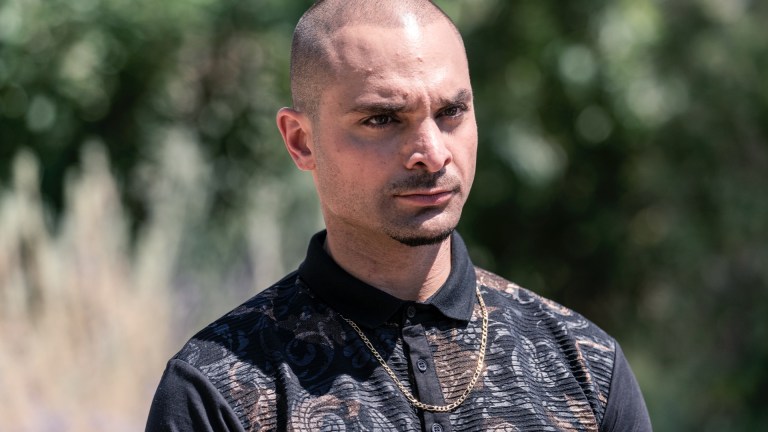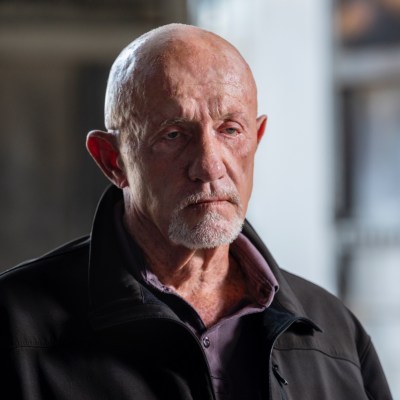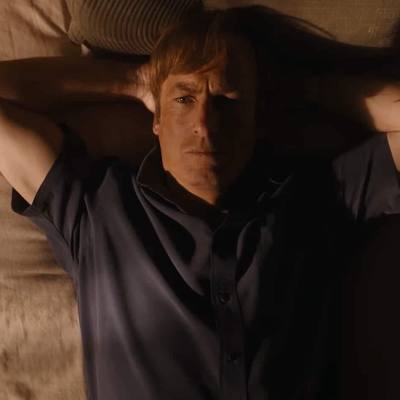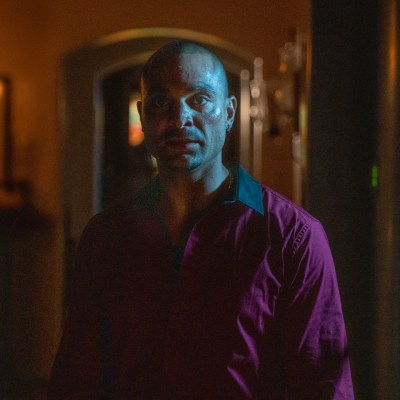Better Call Saul Season 5: Michael Mando Discusses Nacho’s Journey
Nobody had a busier Better Call Saul season 5 finale than Ignacio "Nacho" Varga. Actor Michael Mando joins us to break it all down.

This interview contains spoilers for Better Call Saul season 5 episode 10.
The combined Breaking Bad and Better Call Saul universe is filled with characters who made it far past their expiration date. In Breaking Bad season 1, either Jesse Pinkman (Aaron Paul) or Hank Schrader (Dean Norris) were supposed to die in the finale before the writer’s strike gave creator Vince Gilligan some time to think. Both Jesse and Hank were spared the script’s axe and went on to become two incredibly important characters in television history.
Likewise, look at the title character of Better Call Saul himself. When Bob Odenkirk’s Saul Goodman was first introduced in Breaking Bad season 2, who could have imagined that he would not only last through the end of that season, but would become his own antihero in a prequel series that is set to surpass the original’s run by one episode?
Still, no character on Breaking Bad or Better Call Saul has proven quite so hard for the saga to shake than Michael Mando’s Ignacio “Nacho” Varga. Nacho was introduced in Saul’s pilot episode as a high-level member of the Salamanca crime family. Along with Tuco, he was the first member of the crime world to intersect with Jimmy McGill’s legal storylines. Since then his role has only grown and his personality has become more complex, culminating in this thrilling Better Call Saul season 5 finale when he is handed an impossible task.
Gus Fring has Nacho under his thumb and also needs someone to help him take care of his Lalo problem. That’s how the man who wants out of the drug game more than anything becomes more enmeshed in it than ever before. We spoke to Michael Mando about Nacho’s penchant for survival, his character’s meeting with powerful mob forces, and his own passion for music.
DEN OF GEEK: It really seemed like your character was doomed going into this finale. When they announced that they were doing interviews with you, I even thought “oh, surely he’s a goner then.” And yet here Nacho stands at the end of this. Did it surprise you that you made it out of this alive and there’s still more Nacho to come?
MICHAEL MANDO: I think you focus so much on the arc of the character. To me, what moved me so much with this experience as we’re getting to the end, is that the writers were able to change his archetype. This is a character who starts off as maybe kind of like the typical gangster character, the iconic gangster character in the sense of an icon, like an image… the Scarface, and then becomes the antithesis of Scarface. He starts off as, “Okay, this guy wants power, he wants money, he wants to be powerful in the cartel.” And when you get towards the end of his arc, you realize that it’s completely flipped. He’s a character who really has a true moral call. It’s very pure. He doesn’t question his drive towards morality anymore. He knows he wants out. He knows he wants to save his father’s life. He’s willing to turn it down, all the power in the world and all the money.
That’s really what my focus is on more than whether or not he makes it out alive. It’s how does a man react in a situation that feels completely helpless? What choices is he going to make and how far is he going to have to go? I don’t know how long he can live, but I do know that it’s a story of redemption. I really hope that he gets to find some kind of redemption, whether in this physical realm or a metaphysical kind of a redemption or a redemption within his soul before he dies. Characters like that deserve a second chance, I think everyone can walk towards the light. So we’ll see how it ends.
One of the more interesting scenes in the finale is Nacho’s conversation with Don Eladio. When Don Eladio asks Nacho what he wants most, he can’t answer truthfully but in a way he still does. He says “I want to not have to look over my shoulder.” What was it like to deliver that line in that scene with such a powerful character and communicate Nacho’s modus operandi in a secretive way?
Honest to God, that scene was really magical, man. I love (Don Eladio actor) Steven (Bauer). We just hit it off right away. He was so warm. We did his coverage first. (Showrunner) Peter (Gould) asked me if it was okay because he preferred it that way. And I said of course. When we got towards my coverage the sun was setting. Peter came to me and whispered, “Tell him the truth.” Then they yelled, “Action,” and it was unbelievable, man. The set was so quiet. We could hear a hummingbird flying around while Steven and I were doing it. When that scene was over, it felt like we were in this vortex of reality, and it was just unbelievable. I don’t know how it turned, but it was like… It’s like… I can’t explain it.
Every time I get into Nacho’s skin, it’s like your heart tightens and everything is so sharp. You have to pay attention to everything that’s going on. All your senses are hyperactive because it’s do or die, it’s life or death at every second. There are these moments like with Mike in episode seven when we’re talking outside in front of his car, or when my father first walks in my home, or when I’m speaking to Don Eladio in that moment. There are these moments where it’s like through all the storms, you get to the heart of the man and you realize how tender it is.
It’s interesting that you guys heard a hummingbird because it seems like that would match the rhythm of Nacho’s heartbeat at that moment.
It really, really did. It was great. We were outside, and you’d imagine there’d be a lot of noise and movement and stuff… it was just… you could hear a pin drop, and this hummingbird just showed up and was just hovering around us. And we were looking at each other like, “Don’t break focus. Whatever energy and magic this bird is bringing to the scene, use it.”
One of my favorite things about Better Call Saul and Breaking Bad is that both shows are full of characters that are really resourceful and crafty and good problem-solvers. What was the deal with that technique that Nacho was using to open the lock? Like folding up foil and putting it in the lock, did Peter explain to you where that came from?
That was unbelievable. I didn’t know that you could do that. I was so, so, so encouraged by the fact that you could do it. I tried it, and it actually works! I do remember telling Peter “you guys have no idea how brilliant this is because you guys are in the room all the time. But for someone reading it for the first time, this is so cool. I hope you guys put a bit of emphasis on it because it’s just like, how the hell did you guys come up with that?”
I didn’t know about it before at all. I discovered it while we were doing it. It was really hard to play that scene being so nervous and shaking and trying to cut up this kind of foil, and you’re going to put it in your pocket and hope that you don’t move, you know? That sequence was really, really cool. It’s so symbolic too because your life depends on this paper thin little knick-knack that you crafted. It’s like your life is paper-thin.
Peter and Vince (Gilligan) are both able to summon up tension out of the most mundane things.
It’s because they put you in the heart of the character. It’s like when you’re presenting to class for the first time, and you’ve got butterflies, and you feel like the world’s going to end. To you, it really is going to end, but to the rest of the world, no one’s even aware that that’s going to happen.
I remember when I was in theater class my first time I would literally shake when I had to go up and do my scene. I would be like a ball of nerves. What got me to overcome that fear is when I’d take the subway to class, I’d get up, and I’d just randomly start changing seats in the subway. I knew that what I was doing was completely inoffensive. But I also knew that people were looking at me with a certain amount of judgment. I said to myself, “If you can get over that fear of judgment, knowing that there’s nothing at all you’re doing is wrong, then maybe you can do this acting thing.” (Peter and Vince) are able to get into your head at that particular moment.
Nacho and Lalo have been pretty closely tied this season and throughout basically the whole Breaking Bad, Better Call Saul shared history. What’s it been like to work with Tony Dalton really closely throughout this season?
Man, Tony and I became great friends and really had great philosophical talks on and off the set and shared a lot of personal stuff. Tony was actually one of the people who kind of really pushed me to release music. He knew that I sang and he was really supportive of that. And I just released my first single called “The Wild One.”
I wrote it while we were shooting Better Call Saul. I had the really, really, really bad fortune of finding out that my father had liver cancer and it was terminal. It was really hard because I was shooting a character that was trying to save his father’s life. And in my real life I realized there was nothing I could do. It was so hard for me and music was the only outcome because I’ve been writing since I was a kid. I just released it two days ago and the reception has just been overwhelming. It’s playing all around the world. They’re playing it in like Turkey stations and in Europe and all that stuff. So, I’m very, very grateful for that.
Is anything else you want to add about your experience with Better Call Saul this season?
I just want to say a real big, warm thank you to the fans. They’ve been so responsive to the inner life of Nacho that I hold really dear. They’re so loving to the character and loving to me as an actor, and I’m so grateful for that.




